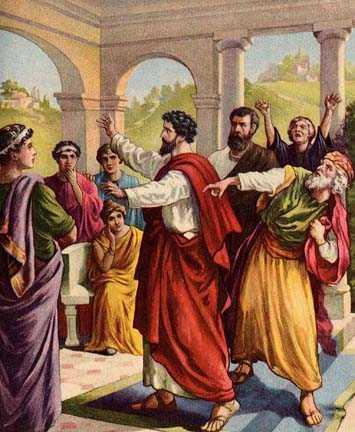|

The troubles that Paul encountered in Ephesus are scantily told by Luke, but the riot in Ephesus is one vivid example
of how people with business interests can join with those who have strong religious beliefs to try to prevent change. The
sale of silver images of the temple and of Artemis declined when Paul preached that "gods made by human hands are not gods
at all" (Acts 19:26). So Demetrius, a leader of the silversmiths, told a group of tradesmen that not only would a lot of people
be out of work, but "the sanctuary of the great goddess Diana [or Artemis, as she known to Greeks] will cease to command respect;
and then it will not be long before she who is worshiped by all Asia and the civilized world is brought down from her divine
preeminence" (Acts 19:27).
Demetrius was right in his judgment of the situation, and perhaps he can be considered to have won the skirmish. His
speech caused an uproar in the city and the mob rushed into the large theater shouting, "Great is Diana of the Ephesians"
for about two hours. The city clerk was called in to tell the crowd that it had legal recourse through the court for redress
of injuries if the missionaries had done anything wrong, but that the rioters were in danger of prosecution if they continued.
By then most of the people in the theater did not know why they had come in the first place. So the clerk dismissed the meeting
and the city calmed down. However it was apparent to Paul that he had better leave. Calling the believers together, he said
goodbye to them with words of encouragement and set off for Macedonia (Acts 19:28-20:1).
|
